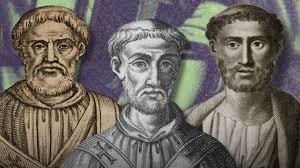How African popes changed Christianity and gave us Valentine's Day

BBC | Now predominantly Muslim, North Africa was once a Christian heartland, producing Catholic popes who left their mark on the Church to this day.
Their papacies were in the era of the Roman Empire, which stretched across modern-day Tunisia, the north-east of Algeria and the coast of western Libya.
"North Africa was the Bible Belt of ancient Christianity," says Prof Christopher Bellitto, a historian at Kean University in the US.
Many Catholics in Africa are hoping that that the papacy will return to the continent for the first time in more than 1,500 years, as a successor to Pope Francis is chosen.
Here, we look at the three previous African popes - and how they got Christians to celebrate Easter Sunday and St Valentine's Day.
All three have been recognised in the Church as saints.
Thought to be of Berber origin, Pope Victor I was in charge of the Catholic Church at a time when Christians were sometimes being persecuted by Roman officials for refusing to worship Roman gods.
He is perhaps best known for ensuring Christians celebrate Easter on a Sunday.
In the 2nd Century, some Christian groups from the Roman province of Asia (in modern-day Turkey) celebrated Easter on the same day that Jews celebrated Passover, which could fall on different days of the week.
However, Christians in the Western part of the Empire believed that Jesus was resurrected on a Sunday, so Easter should always be celebrated on that day.
The debate over when the resurrection took place made it an extremely contentious issue.
The "Easter controversy" was symbolic of larger conflicts between East and West, and whether or not Christians should follow Jewish practices.
Victor I called the very first Roman Synod - a gathering of Church leaders - to resolve the impasse.
He did this by threatening to excommunicate from the Church those bishops who refused to comply with his wishes.
"He was a rather forceful voice for getting everyone on literally the same page," Prof Bellitto told the BBC.
This was an impressive feat, the historian said, because "he was the Bishop of Rome when Christianity was illegal in the Roman empire."
Another important part of Victor I's legacy was to introduce Latin as the common language of the Catholic Church. Previously Ancient Greek was the primary language of the Catholic Liturgy as well as official communication for the Church.
Victor I himself wrote in - and spoke - Latin, which was widely spoken in North Africa.
Pope Miltiades is believed to have been born in Africa.
During his reign, Christianity gained increasing acceptance from successive Roman emperors, eventually becoming the Empire's official religion.
Before this, the persecution of Christians had been widespread at different points in the Empire's history.
However, Prof Bellitto pointed out that Militiades was not responsible for this change, saying the Pope was the "recipient of the Roman benevolence" rather than being a great negotiator.
Miltiades was given a palace by the Roman Emperor Constantine, becoming the first pope to have an official residence.
He was also granted permission by Constantine to build the Lateran Basilica, now the oldest public church in Rome.
While modern popes live and work in the Vatican, the Lateran church is sometimes referred to in Catholicism as "the mother of all churches".
North Africa was the Bible Belt of ancient Christianity," says Prof Christopher Bellitto, a historian at Kean University in the US



0 Comments